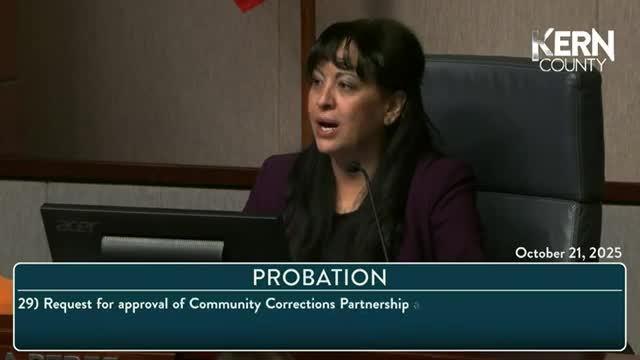Kern supervisors approve $8.5 million Community Corrections Partnership awards after debate over loss of New Life beds
Get AI-powered insights, summaries, and transcripts
Subscribe
Summary
The Kern County Board of Supervisors on Wednesday approved the Community Corrections Partnership’s recommendations for the county’s community‑based organization funding cycle for calendar years 2026–2028, allocating $8.5 million for housing, supportive services and other programs aimed at people involved in the criminal justice system.
The Kern County Board of Supervisors on Wednesday approved the Community Corrections Partnership’s (CCP) recommendations for the county’s community‑based organization (CBO) funding cycle for calendar years 2026–2028, allocating $8.5 million for housing, supportive services and other programs aimed at people involved in the criminal justice system.
The vote followed hours of presentations, a summary by Chief Probation Officer Bill Dickinson and about a dozen public speakers — many of them program graduates and religious leaders — urging the board to preserve funding for New Life Recovery and Training Center, which faces the loss of 54 sober‑living beds under the CCP evaluation committee’s recommendations.
The CCP recommendation, developed after a competitive request‑for‑proposal process, was the product of a multi‑agency evaluation committee that rated 13 proposals requesting a combined $21.96 million. The evaluation committee reported that 11 proposals scored above the county’s minimum threshold and that the county had only $8.5 million available for awards. Chief Probation Officer Bill Dickinson told supervisors the committee focused on increasing housing bed days while staying within the available funds.
"To fund the full amounts of all the requests would require a 158% increase in allocated funds," Dickinson said during his presentation. He also explained the committee’s priorities: "Providing people needing treatment and other services a place to live and a supportive environment within the bounds of the resources available was paramount for the committee." (Bill Dickinson, Chief Probation Officer)
New Life leaders and alumni urged the supervisors to revisit the recommendation. Raylene Dougherty, identified in the meeting as the program administrator for New Life, said the loss of contract funding would be “a great loss” to the community and to the facility that has operated sober‑living beds and related services since about 2009. "54 beds that would not be occupied for the next calendar years of '26, '28 will be a great loss," Dougherty told the board.
Graduates and partners gave personal testimony about New Life’s outcomes and workforce connections. Graduate Enrique Zepeda described the program’s structure, saying it helped him transition to stable employment and promoted a daily recovery practice. Community partner Michael Bowers said New Life provides both "sobriety and a paycheck," and asked the board to allow time to explore alternative funding.
The evaluation committee reported that its final allocations increased housing funds by 9 percent relative to the prior cycle and reduced allocations to education, vocation and employment and to case management. The committee said the 2026–2028 cycle will provide 157,533 bed days — an increase of about 3.5% over the previous cycle — which the committee said would serve roughly 1,050 people for an average of 150 days each.
Key funding figures described by staff during the hearing included: - Housing: increased to $7,140,803 (from $6,375,000) - Education, vocation and employment: reduced to $509,414 (from $1,020,000) - Case management: reduced to $305,649 (from $595,000) - Other evidence‑based programs: increased slightly to $544,134 (from $510,000)
New Life’s overall weighted score in the housing category was 88.6, ranking seventh among seven housing applicants; the lowest scoring awardee that received funding had a weighted score of 92.9, according to the evaluation committee’s summary presented to the board.
Supervisors voiced concern about losing the specific bed space New Life provides, particularly for clients on electronic monitoring and for residents in the city’s eastern neighborhoods where New Life is located. Supervisor Flores pressed staff about the transition plans and the scoring methodology; Lindy May, the departmental analyst who coordinated the RFP, told the board that vendors applying for multiple target areas provided transition plans for each area and that housing transition plans did not present deficiencies for any applicant.
County officials also explained options for addressing any shortfall after the contracts are executed: the CCP maintains a CBO contingency fund and can consider contract amendments or short‑term increases when waiting lists materialize, though staff cautioned the county is already leveraging contingency funds and the available annual allocation for the program.
After public comment and board discussion, Supervisor Couch moved to approve the CCP recommendations; the motion passed unanimously with an "all ayes" vote. The board did not continue the matter to a later meeting.
The board’s action approves the CCP evaluation committee’s recommended awards and directs staff to implement contracts consistent with those recommendations. Staff and supervisors said they will continue conversations with New Life and other stakeholders about bed availability and possible funding options in the future.
Votes at a glance - Action: Approve CCP recommended awards for the CBO program (calendar years 2026–2028) and related contracts, as recommended by the Community Corrections Partnership. - Motion: approve CCP recommendations (mover recorded as Supervisor Couch; second not specified in the public record) - Outcome: approved (motion passed; "all ayes")
Why it matters The CCP funds aim to provide reentry housing and services for people under realignment and on community supervision. The board’s decisions determine how limited county realignment dollars are distributed among housing, case management, and workforce programs and directly affect which local providers receive contracts and how much bed capacity will be available to justice‑involved residents.
What’s next County staff said contracts will be finalized so services can begin under the new awards on January 1, 2026. Board members and the county administrative office indicated a willingness to meet with New Life and the CAO’s office to explore additional resources or contract adjustments if waiting lists increase or service gaps become evident.
